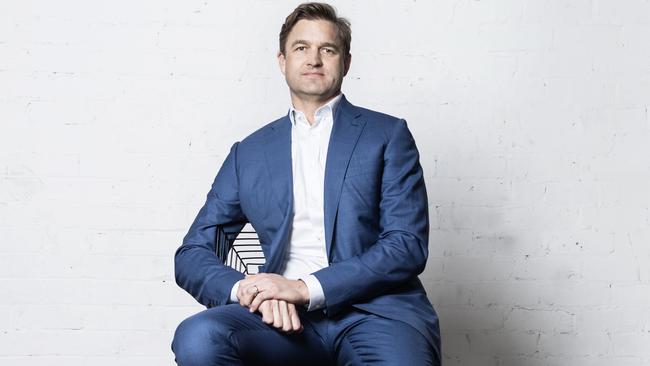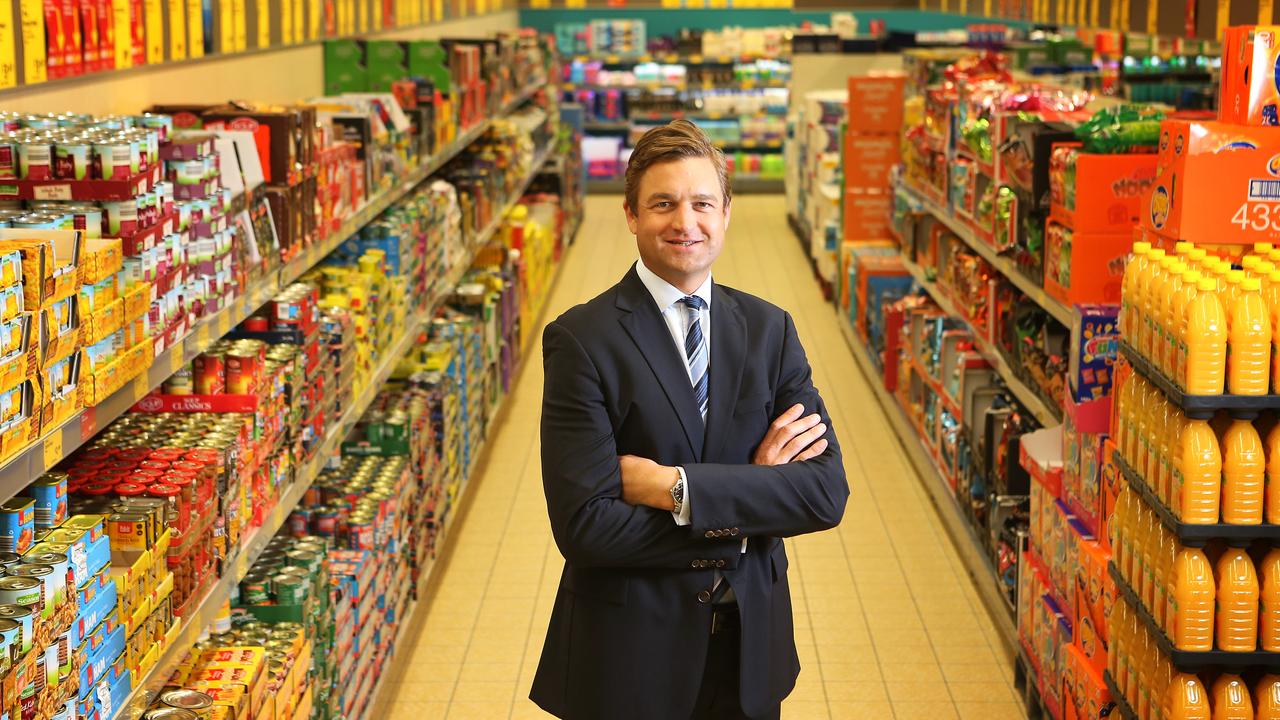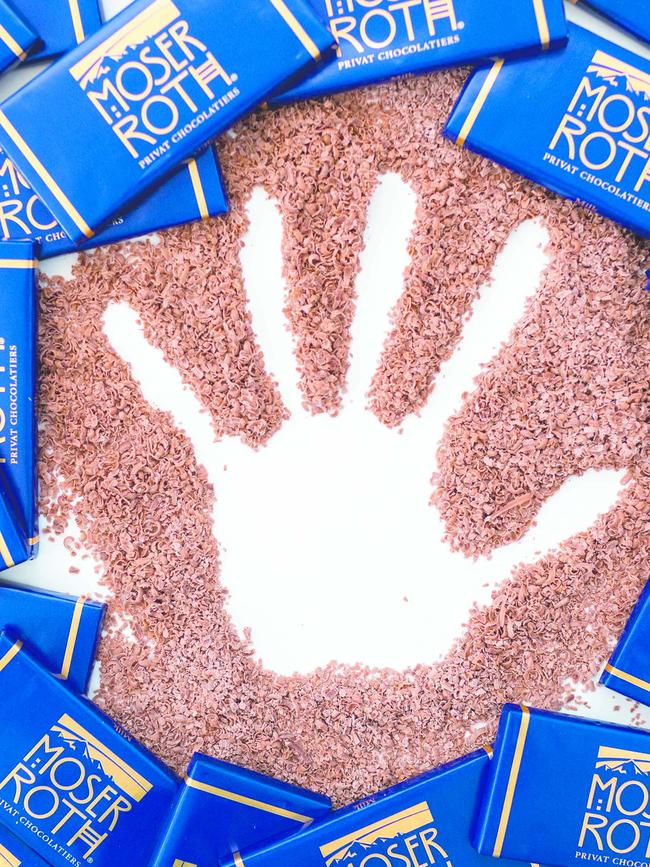Aldi Australia CEO Tom Daunt on the way we shop
In a rare interview, Aldi’s Australian CEO explains why bells and whistles aren’t part of the German discounter’s model.

Every week someone tells Aldi boss Tom Daunt how to do his job. Suppliers, customers, well-wishers – they all have ideas about how to ratchet up the German discount supermarket’s sales and earnings in Australia. So far he has several thousand suggestions about how to improve on a business model that has captured 10 per cent of the market in less than two decades.
“There are thousands, honestly,” says Daunt, a former Victorian country boy who has spent eight years as the head of the German chain in Australia. “We are presented with good ideas every day. People who say: Why do I need $2 for a trolley, can’t you just unlock it? Why can’t you give me a throwaway bag? Why can’t you pack for me at the register? Why can’t I have more products? Why can’t I have a sushi bar in my store? Why don’t you sell barbecued chicken? ”
Daunt, 45, has no compunctions about rejecting these suggestions. To him they risk spoiling the secret ingredient of the Aldi business model, the reason for its massive international growth and fat profit margins, the very DNA of the group: simplicity. “That’s the real trick to running our business model,” he tells The Deal.
We are talking as he prepares to open an exhibition of photographs taken by Aldi customers depicting what Aldi means to them. That’s the level of loyalty the chain generates in Australia.
Daunt says: “It is choosing what not to do, right? And we decide every day things not to do because that keeps our business simpler and more efficient. And that efficiency … is what underpins a very low cost of doing business, which underpins our ability to serve great quality products at the lowest price.”
Case in point: Coles and Woolworths sell about 50 million barbecued chickens every year – a quick and easy money-spinner for both chains. Aldi refuses to compete, even though its small stores could easily house a barbecued chicken stand. It’s the complexity around the logistics, storage and sale of these golden chickens that frightens Daunt. For him it is just not worth the extra profit. “Our philosophy is: let’s focus on what matters and do the right thing about the cost,” he says.
It’s the same when it comes to loyalty cards and rewards schemes. Coles, Woolworths and other retailers pour tens of millions of dollars into loyalty cards and the two major super-markets grow their investment in data mining. Aldi doesn’t care.
“Now, data is interesting but we’re not really interested in it,” says Daunt. “You can criticise that decision but at the moment this is one thing we’ve decided not to do. We look at other’s loyalty programs and their big data schemes and we really question the true value that’s delivered to customers by having a piece of plastic in their wallet and getting a few points to spend on a kettle. What we’d rather do is keep our business simple, focus on what matters most to customers, because it’s great quality products at the lowest possible price.
“We can afford to do that and that’s our loyalty. I would say we have the highest customer loyalty in Australia or the UK.”
‘When the first Aldi store opened here in 2001, Australian shoppers didn’t quite know what to make of its strange brands.’
No one can suggest that Aldi has failed on the loyalty front. It consistently ranks as one of the most trusted brands in Australia, and that is backed by $8 billion in sales each year. Who needs Flybuys, rewards points or plastic toy giveaways when your sales growth is more than double that of other supermarkets?
Everyone has an opinion on Aldi – whether it is former Australian of the Year Dick Smith recently lashing out at the discounter for its aggressive expansion in Australia, or the legion of loyal fans who often line up outside the store on Wednesdays and Saturdays when its sales of new products are launched.
Then there is the strange effect it has on shoppers, most evident during its annual snow and ski gear sale, which can see scuffles in the aisles and entire families stripping off in store to try on clothing. Aldi is now the single biggest retailer of ski gear in the country. But thanks to its idiosyncratic inventory, it also sells more tinned tomatoes than any other supermarket chain and has the biggest volumes of nappies outside of leading brand Huggies.
It wasn’t always the case. When the first Aldi store opened here in 2001, Australian shoppers didn’t quite know what to make of its strange and unknown chocolate brands, groceries stacked on pallets, and checkouts where staff rushed through groceries at lightning speed, forcing customers to pack their own bags at a manic pace. Aldi charged money for its reusable bags from day one, almost two decades before Woolworths and Coles had to deal with the plastic bags saga this year.
Even Daunt admits that Aldi was initially viewed as kind of weird. Or worse, “cheap and nasty”.
“Originally, we started out … and we’re perceived as really unusual and very discount; why would you go there?” he says. “It’s cheap, it must be nasty … and that phrase with Australians rolls off the tongue … cheap and nasty. There’s a period where people have to come to understand that because it costs less it doesn’t mean you trade quality. That’s the uniqueness of our business model.
“But we’ve moved customer perception … from [our first store in] 2001 all the way from ‘What is this? It’s a bit weird. Private label, it cannot be good … don’t go there’ to ‘Oh my goodness, it’s as good a quality as everybody else. I like the chocolate even more than Cadbury and it’s half the price too – these guys are awesome!”

There is a touch of the evangelist in Daunt, who joined Aldi in 1998 at the age of 25 and spent more than five years in the UK – first as an area manager and then as store operations director running more than 60 outlets. He came back to Australia in 2004, setting up the Queensland business, and became MD for Aldi Australia eight years ago. In April 2015, he was named as CEO, Aldi Australia.
Of the German chain, he says: “We always find perception follows reality. It’s a really basic principle, but that underpins a huge amount of what we do. So we care a little less about what people think or suspect versus what is the reality.
“We of course want people to shop with Aldi and nothing makes me happier than when somebody, you know, comes in and they walk in the first door. It’s a bit weird to start with. You think, well I don’t recognise the products. This is all a bit funny. There’s no staff on the shop floor. What do I do with this check out? They’re not packing my bags. How do I get a trolley? There’s a lot of things that are very different with Aldi, but at the end of the day people walk away with a product that is of really high quality and the basket that’s 20 per cent to 30 per cent on average cheaper than the competition, and it’s that reality that drives the perception.”
Daunt studied logistics – rather than retail – at Victoria University and has a Master of Business from the University of Queensland. He began working in logistics in the UK, and then migrated to store operations and merchandising as he rose through the Aldi ranks.
He says Aldi’s trademark simplicity has also influenced his leadership style. He is economical with his words and thrifty with his management – just like the stores he oversees.
“I’ve got a very authentic, genuine, no-nonsense leadership style,” he says. “I’m not particularly patient. I value people really highly. I don’t waste a lot of words. I ask a lot of people, give as much support as possible and then give them the freedom to act. So that’s a personal style that I have, but that fits with and is overlaid by a very strong corporate culture. That culture is one of the things that makes us very different and very distinct from many, many other businesses I’ve come across.
‘The discounter has its critics. Serial entrepreneur Dick Smith attacked the chain for its “endless expansion” in Australia.’
“The three values we operate with are consistency, responsibility and simplicity. Those values are embedded in literally thousands of processes, decisions, relationships we have all over the company. We have a very flat corporate structure that’s extremely lean, and what that means is there are far fewer people to do what other organisations of a similar size would pull off. It means everybody who has a position in Aldi has to be very clear about what they’re there to do. They have to understand their responsibility. We delegate them clear decision-making authority. We train and develop them, and then we give them room to act and we get out of the way. So we don’t have complex bureaucratic layers of supervision and cross-checking and so on. It’s very lean and very simple.”
For all the crowds who flock to the stores, the discounter has its critics. In July, serial entrepreneur Dick Smith attacked the chain for its “endless expansion” in Australia, which he claimed was potentially hurting farmers and food processors as it pushed prices lower. Smith wrote to Aldi’s owners, members of the Albrecht family, blaming them for everything from not sharing their wealth with Australians to not employing enough staff.
Daunt is quick to defend a business that is now the third force in the $90 billion grocery sector, employs more than 11,500 people and is a key customer of 1000 suppliers.
“Look, I always hesitate to criticise anybody, whether it be a former Australian of the Year or anyone,” says Daunt. “The reality is we’ve got a very successful business in Australia and I’m very proud of what we’ve built in the past 17 years. We’ve got a lot of customers who are really loyal to us. The reality is that over 17 years we’ve built a market share of around 10 per cent now and … by deduction, 90 per cent of all grocery business in Australia doesn’t occur inside Aldi. So I would say politely it’s a little bit of a long bow to draw a parallel between our entry and some of the accusations that have been made.”
A promising AFL footballer in his youth, the 198cm (six foot six) Daunt still bears the scars of that sports journey, which ended when he snapped his anterior cruciate ligament. He has had 14 knee operations and two years ago had a total knee replacement. It’s no surprise, then, that his sporting passion now revolves around the golf course, where he has a competitive handicap of 10.5.
And life beyond Aldi? “I’ve got a beautiful but demanding wife and three kids … 15, 13 and 10 … so I’m a highly paid taxi driver for about three-quarters of the weekend,” he says. “If I ever get any time away, I love golf and I do play a little bit of golf, not as much as I’d like but intermittent. I go hard on the holidays and then I forget everything I have just become good at.
“I went to the US Master’s this year for the first time ever. It’s been a lifetime ambition, one of the boxes you have to tick, and I was lucky enough to play quite a few world-class courses. There is a course called Cyprus Point – it’s just around the corner from Pebble Beach. They call it the Sistine Chapel of Golf. It was designed by a fellow called Dr McKenzie, a very famous course designer in the 20s and 30s. I managed to have a game there. My all-time highlight of golf? That would be it.”
-
LOYAL FOLLOWING


Aldi MiniRoos partnership encouraging a healthy and active lifestyle, photograph
by Jacci d’Mellow.



To join the conversation, please log in. Don't have an account? Register
Join the conversation, you are commenting as Logout